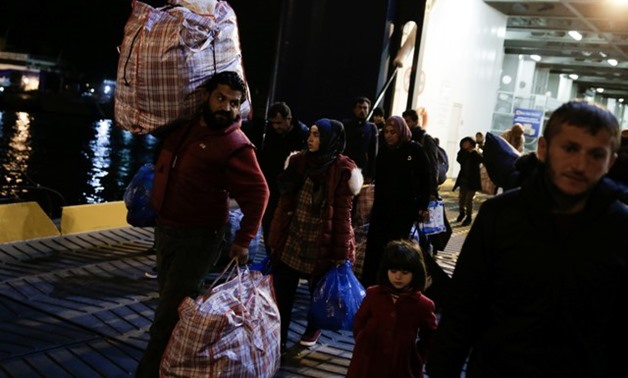CAIRO - 7 August 2022: The International Organization for Migration (IOM) announced Sunday that the current number of international migrants residing in Egypt reached a total of 9 million migrants and refugees.
In its latest assessment of migrant stocks in Egypt, IOM revealed that the current number of international migrants residing in Egypt was 9,012,582 equivalent migrants to 8.7% of the Egyptian population (103,655,989).
This migrant population consists of people originating from 133 countries, among whom the biggest groups are Sudanese (4 million), Syrians (1.5 million), Yemenis (1 million), and Libyans (1 million). These four nationalities constitute 80% of the international migrants currently residing in the country.
A notable increase in the number of migrants stock since 2019, due to protracted instability in the neighboring countries of Egypt has driven thousands of Sudanese, South Sudanese, Syrians, Ethiopian, Iraqi, and Yemeni individuals to find refuge in Egypt.
The Government of Egypt's positive discourse towards migrants and refugees may be seen as a pull factor for the recent migrants, refugees, and asylum seekers flow. Egypt has been generous in including migrants, refugees, and asylum-seekers in the education and health national systems, including on a level footing with Egyptians in many instances, despite the challenges these two sectors are facing and the high economic costs. The inclusion of the migrant population in the national COVID-19 vaccination plan is a clear recent example of the Government of Egypt's approach to treating migrants, as equal to Egyptian citizens.
The analysis shows that the average age of the majority of migrants is 35 years old with a balanced percentage of males (50.4%) and females (49.6%), with a majority of them (56%) residing in five governorates: Cairo, Giza, Alexandria, Damietta, and Dakhaleya. The rest of the migrants live in governorates, such as Assiut, Aswan, Gharbiya, Ismailia, Luxor, Marsa Matruh, Menoufiya, Minya, Port Said, Qaliuyiba, Qena, the Red Sea Governorate (Hurghada, Sharm Al-Sheikh with small numbers in the Sinai Peninsula, specifically Dahab city), Sharqyia, Sohag, and Suez.
Also, the data collected from embassies and IOM studies reveal that more than one-third of the population (37%) are working in stable jobs and businesses, indicating that migrants in Egypt are positively contributing to the labor market and the Egyptian economic growth.
For instance, Syrians who constitute 17% of international migrants’ stocks in Egypt, are one of the top nationalities contributing positively to the labor market and the Egyptian economy. It is estimated that the number of funds invested by 30,000 registered Syrian investors in Egypt is approximately 1 billion dollars [6]. This reflects the importance to enhance the integration of migrants to positively impact their host society.
The analysis of the duration of the stay of migrants in Egypt demonstrates that 60% of those international migrants living in Egypt are well integrated for more than 10 years (5.5 million persons), with 6% integrated for 15 years or more (second generations included).
This assessment allows IOM to review its latest assessment on the migrants’ stock in Egypt conducted in 2019. It helps the Organization to plan its responses to the actual needs of the migrants residing in Egypt.
Moreover, it highlights the importance of better recognizing the differences between those migrants who reside for years and generations (between 11 and 15 years) in the country and integrating the Egyptian society while contributing to its growth, from those international migrants in need of support.
Based on its daily assessment of migrants' needs, IOM estimates, through sampling analysis, that 15% of the international migrants in Egypt (between 1,1 and 1,300,000) can be considered as“vulnerable migrants or persons of concern to IOM who may need tailored assistance. A such vulnerability has been exacerbated by the recent COVID-19 pandemic hitting the informal market for both migrants and Egyptians. IOM support includes cash-based interventions, housing subsidies, food and non-food, education, and health assistance.
IOM Egypt started its assessment in October 2021 which was concluded with concrete quantifiable and qualifiable results in June 2022. IOM has used multiple research methods to get the most accurate number and profile of migrants in Egypt.
The surveys were done through consultations with diplomatic representations of more than 100 countries present in Egypt, coupled with migrant focus groups, surveys among 63 community leaders, as well data collected by the Organization through its daily interaction with migrants, academic desk review of available data on migrants’ stocks in Egypt and past IOM empirical studies.
IOM collected information on the number of international migrants in Egypt, disaggregated by gender, age, location, duration and purpose of a stay, as well as work status.
The result of the most updated analysis is available on the website: bit.ly/3QgOKNk
The Government of Egypt embodied in the Ministry of Foreign Affairs jointly with IOM continuously develops a series of mechanisms and support to ensure the protection needs of migrants and to capitalize on the development potential of migrants in Egypt.
Furthermore, IOM Egypt has cooperated with youth non-governmental organizations, in close coordination with the Ministry of Youth and Sports, to create more than 100 environmentally friendly livelihood opportunities in Cairo and Alexandria, such as recycling, waste management, green enterprises, and hydroponic farms.
IOM Egypt also collaborates with the Ministry of State for Emigration and Egyptian Expatriates’ Affairs to create conditions for the Egyptian expatriates (estimated 10 - 14 million)[7] to fully contribute to the sustainable development of Egypt.
In November 2021, the Ministry of State for Emigration and Egyptian Expatriates Affairs launched the National Strategy on Expatriates’ Engagement with the support of IOM. This is a tool for Egyptian expatriates willing to invest in their country of origin as actors in the national development process.

Comments
Leave a Comment